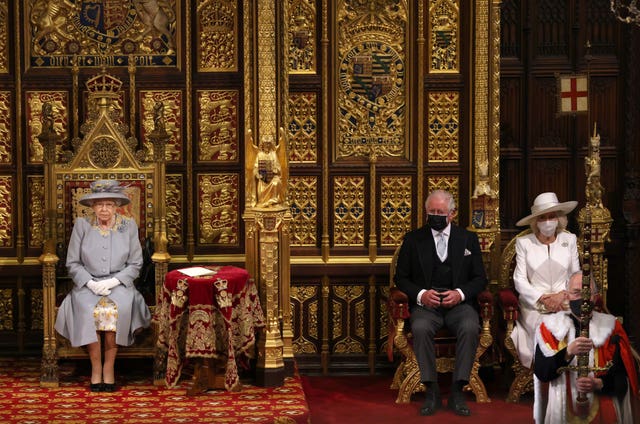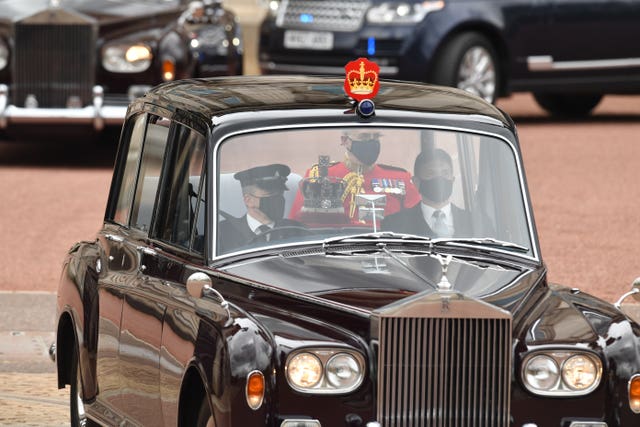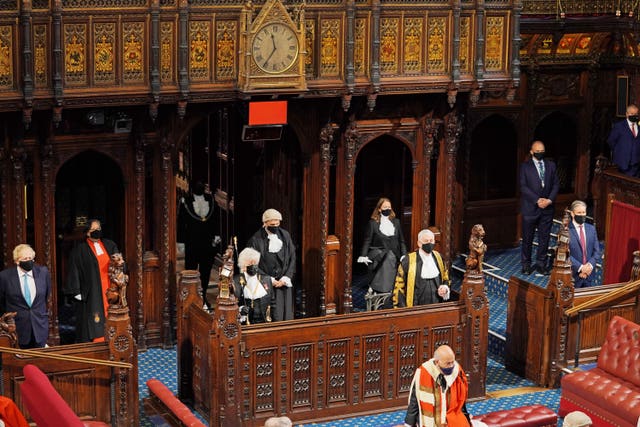
Boris Johnson promised to unleash the “pent up energy of the UK economy” as he set out the Queen’s Speech but faced questions over the Government’s delayed plans for social care.
The Queen unveiled the Government’s programme in her first major public ceremonial appearance since the death of her husband, the Duke of Edinburgh, but the occasion was stripped of much of its pomp as a result of the pandemic.
The Prime Minister told MPs the programme would “take this country forward” and spread opportunity across the country.
But measures to address the long-standing issue of social care funding were not included in the speech.
Proposals on social care will not appear until later this year – despite Mr Johnson’s promise when he entered No 10 two years ago that he had already prepared a “clear plan” to fix the system.
The Prime Minister said: “We will bring forward proposals to reform adult social care so that every person receives the dignity and security they deserve.”
Labour leader Sir Keir Starmer said the failure to act on social care after the pandemic was “nothing short of an insult to the whole nation”.
Also missing was a Bill on dealing with the legacy of the Troubles in Northern Ireland, although Mr Johnson said legislation will be introduced.
Issues around the treatment of veterans of the Troubles have been highly controversial amid suggestions that any protection from prosecution offered to service personnel may also be extended to terrorists.
Mr Johnson said the Government’s legacy package will deliver “better outcomes for victims, survivors and veterans”, focused on reconciliation and ending the “cycle of investigations”.

The Prime Minister said: “We must harness the ingenuity and resolve that has been revealed in the struggle against Covid-19 and use it to create a stronger, healthier and more prosperous nation.
“We have been given an historic opportunity to change things for the better, level up opportunities across the whole of the United Kingdom, and address the problems that have constrained us far too often before.”
Speaking in the Commons, Mr Johnson added: “We One Nation Conservatives understand this crucial point: that you will find flair and imagination and enthusiasm and genius distributed evenly across this country while opportunity is not.
“And we mean to change that because it is not just a moral and social disgrace, it’s an economic mistake, it’s a criminal waste of talent.”
Around 30 pieces of legislation promised in the speech include:
– A Health and Care Bill to better integrate the NHS and social care systems.
– A Planning Bill to make it easier to build new homes, schools and hospitals.
– New laws to scrap the Fixed-term Parliaments Act, meaning it will be easier for Mr Johnson to call an early general election before 2024.
– A Counter-State Threats Bill to introduce a US-style register of foreign agents to help counter espionage and influence from hostile governments.
– An Online Safety Bill requiring tech giants to tackle illegal content on their platforms and clearly set out in their terms what content is and is not acceptable.
– The return of the controversial Police, Crime, Sentencing and Courts Bill, which saw demonstrations over concerns that it would curtail the right to protest when it was last before Parliament.
– A Higher Education (Free Speech) Bill giving regulators the power to fine universities or students’ unions in England if they fail to protect freedom of expression.

The Government also promised a “levelling-up White Paper” setting out how Mr Johnson intends to meet the promises made to voters in former Labour-voting areas.
Also planned are measures to ban so-called conversion therapy to protect LGBT communities from “abhorrent practices” which can cause mental and physical harm.
Reform of asylum laws aimed at making it harder for people to illegally cross from continental Europe and claim sanctuary in the UK are also on the agenda, although the United Nations refugee agency has called for a rethink and opposition figures have branded the proposals “cruel”.

The usual pomp and ceremony of the State Opening of Parliament was scaled back drastically to reduce the potential for spread of Covid-19, and all attendees had to have a negative test beforehand.
The Prince of Wales and the Duchess of Cornwall joined the Queen at the event, but there were no horse-drawn carriages.
The Queen, in day dress and hat, travelled from Buckingham Palace to the Palace of Westminster by car.
In the Commons, Sir Keir said Mr Johnson had “squandered” the chance to set out a “transformative agenda to rebuild Britain’s foundations after a decade of neglect and a year of national sacrifice”.
The Confederation of British Industry’s UK policy director Matthew Fell said the Queen’s Speech “provides the building blocks for a decade of transformation and inclusive economic growth” but there were “missed opportunities” on measures to revive high streets.


Comments: Our rules
We want our comments to be a lively and valuable part of our community - a place where readers can debate and engage with the most important local issues. The ability to comment on our stories is a privilege, not a right, however, and that privilege may be withdrawn if it is abused or misused.
Please report any comments that break our rules.
Read the rules hereLast Updated:
Report this comment Cancel